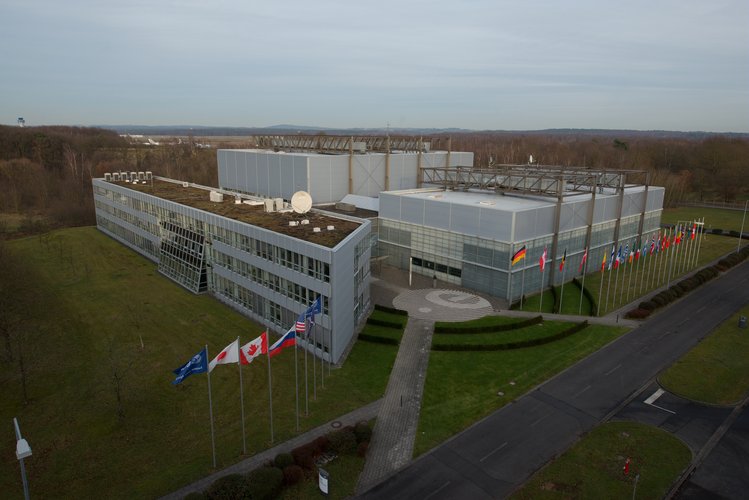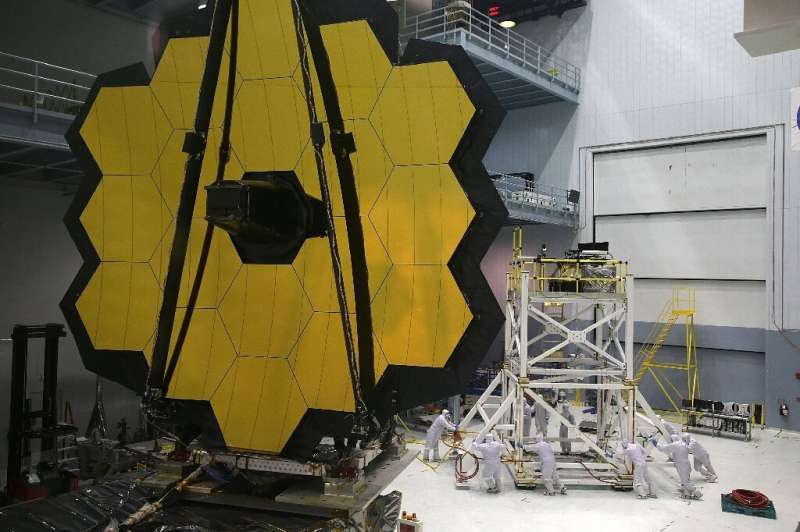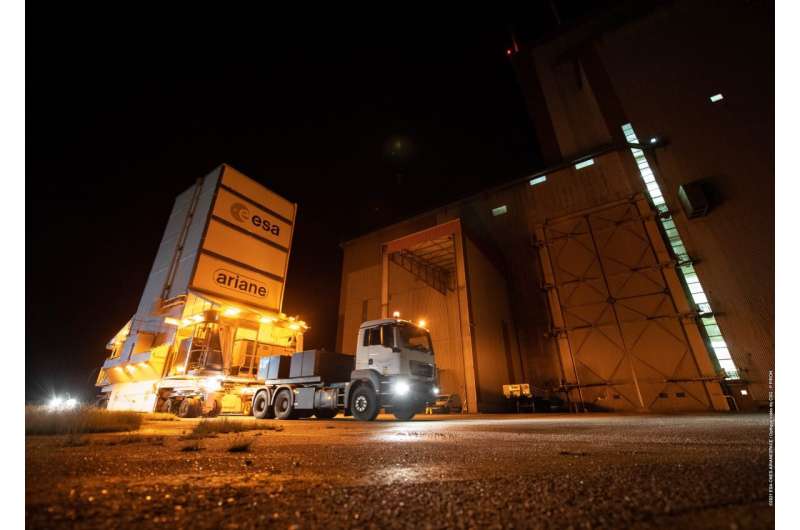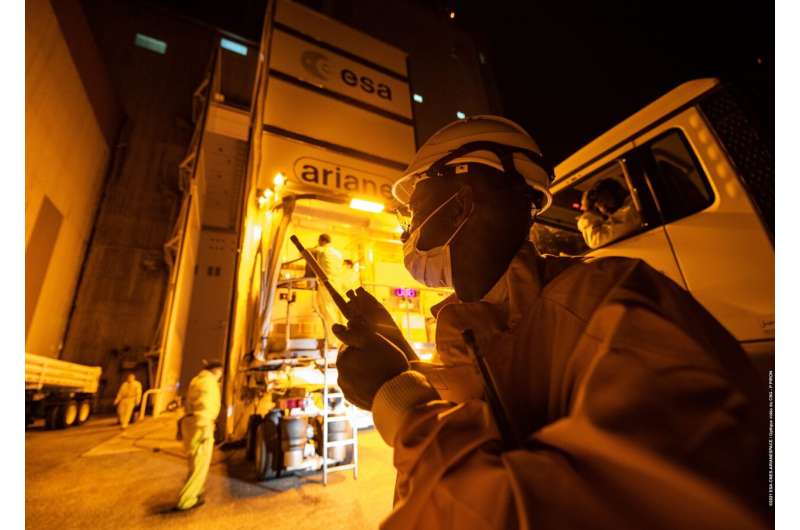
Copernical Team
Astronaut applicants thanked as ESA contacts all candidates

Applicants to ESA’s astronaut selection are being thanked for their patience as thousands of acceptance or rejection notifications are distributed to candidates across Europe.
Earth from Space: Fairbanks, Alaska

The city of Fairbanks, the largest city in the Interior region of Alaska, and its surroundings, are featured in this Copernicus Sentinel-2 image.
Science with Webb: the nearby cosmos
 Video:
00:00:57
Video:
00:00:57
The James Webb Space Telescope (Webb) is designed to answer fundamental questions about the Universe.
One of Webb’s key science goals is to study the nearby cosmos: uncovering hidden parts of our Solar System, peering inside dust clouds where stars and planetary systems are forming, and revealing the composition of exoplanets in more detail.
Exoplanets
Thanks to its powerful capabilities at infrared wavelengths, Webb will offer a unique view of the outer planets in our own magnificent Solar System. Looking beyond, Webb will study in detail the atmospheres of a wide diversity of exoplanets.
Webb can study exoplanets as
Five things to know about the James Webb Space Telescope

The James Webb Space Telescope, the most powerful space observatory ever built, is finally set for launch in late December after decades of waiting.
An engineering marvel, it will help answer fundamental questions about the Universe, peering back in time 13 billion years. Here are five things to know.
Giant gold mirror
The telescope's centerpiece is its enormous primary mirror, a concave structure 21.5 feet (6.5 meters) wide and made up of 18 smaller hexagonal mirrors. They're made from beryllium coated with gold, optimized for reflecting infrared light from the far reaches of the universe.
The observatory also has four scientific instruments, which together fulfill two main purposes: imaging cosmic objects, and spectroscopy—breaking down light into separate wavelengths to study the physical and chemical properties of cosmic matter.
James Webb Space Telescope moved to meet its rocket

On Dec. 7, NASA's James Webb Space Telescope was transferred to the final assembly building at Europe's Spaceport in French Guiana to meet its Ariane 5 launch vehicle.
Stowed inside a special transport container and mobile clean room, Webb's vitals were meticulously monitored throughout the entire process of moving between buildings.
The Ariane 5 rocket Webb will ride to space was moved to the same building on Nov. 29. Here, adjustable platforms allow engineers to access the launch vehicle and its payload.
The next steps ahead are to safely lift Webb to an upper platform which has been prepared so that Webb can be connected to the Ariane 5's upper stage. After being connected to the rocket, technicians will move forward to encapsulate Webb inside Ariane 5's specially adapted fairing.
In preparation for a Dec. 22 launch, ground teams have already successfully completed the delicate operation of loading the spacecraft with the propellant it will use to steer itself while in space.

NASA launches new mission to explore universe's most dramatic objects
 NASA's Imaging X-ray Polarimetry Explorer (IXPE) mission launched at 1 a.m. EST Thursday on a SpaceX Falcon 9 rocket from NASA's Kennedy Space Center in Florida.
A joint effort with the Italian Space Agency, the IXPE observatory is NASA's first mission dedicated to measuring the polarization of X-rays from the most extreme and mysterious objects in the universe - supernova remnants, superm
NASA's Imaging X-ray Polarimetry Explorer (IXPE) mission launched at 1 a.m. EST Thursday on a SpaceX Falcon 9 rocket from NASA's Kennedy Space Center in Florida.
A joint effort with the Italian Space Agency, the IXPE observatory is NASA's first mission dedicated to measuring the polarization of X-rays from the most extreme and mysterious objects in the universe - supernova remnants, superm Webb telescope to look for first light of cosmic dawn
 Peering into deep space and billions of years back in time, the James Webb telescope promises to offer the clearest glimpse yet of the Universe's cosmic dawn, when the earliest galaxies began to form.
The largest and most powerful telescope ever to be launched into space, which will take over from Hubble, will "directly observe a part of space and time never seen before", says NASA.
Th
Peering into deep space and billions of years back in time, the James Webb telescope promises to offer the clearest glimpse yet of the Universe's cosmic dawn, when the earliest galaxies began to form.
The largest and most powerful telescope ever to be launched into space, which will take over from Hubble, will "directly observe a part of space and time never seen before", says NASA.
Th James Webb Space Telescope: A giant leap towards 'other Earths'?
 There is only one Earth... that we know of.
But outside our own solar system, other stars give warmth and light to planets and, possibly, life.
Soon to offer a better look at these so-called exoplanets is NASA's new James Webb telescope, which is set to launch this month and become the largest and most powerful observatory in orbit.
One of its major missions is to look for conditions
There is only one Earth... that we know of.
But outside our own solar system, other stars give warmth and light to planets and, possibly, life.
Soon to offer a better look at these so-called exoplanets is NASA's new James Webb telescope, which is set to launch this month and become the largest and most powerful observatory in orbit.
One of its major missions is to look for conditions Webb telescope aims to answer astronomy's 'biggest questions'
 It's been three decades in the making: the largest and most powerful telescope ever to be launched into space is finally ready to take up its orbit and beam back new clues to the origins of the Universe and Earth-like planets beyond our solar system.
NASA's James Webb Space Telescope, named for a former director of the American space agency, follows in the footsteps of the legendary Hubble -
It's been three decades in the making: the largest and most powerful telescope ever to be launched into space is finally ready to take up its orbit and beam back new clues to the origins of the Universe and Earth-like planets beyond our solar system.
NASA's James Webb Space Telescope, named for a former director of the American space agency, follows in the footsteps of the legendary Hubble - NASA's eventual farewell to tiny Mars helicopter could be emotional
 Tears most likely will flow at NASA's Jet Propulsion Laboratory in Pasadena, Calif., when the extremely successful Mars helicopter Ingenuity sends its last transmission and goes quiet on the Red Planet, according to those who have observed similar closures.
While the end of any space mission can be emotional simply because of a sudden change in routines and departure of colleagues, Ingenui
Tears most likely will flow at NASA's Jet Propulsion Laboratory in Pasadena, Calif., when the extremely successful Mars helicopter Ingenuity sends its last transmission and goes quiet on the Red Planet, according to those who have observed similar closures.
While the end of any space mission can be emotional simply because of a sudden change in routines and departure of colleagues, Ingenui 
